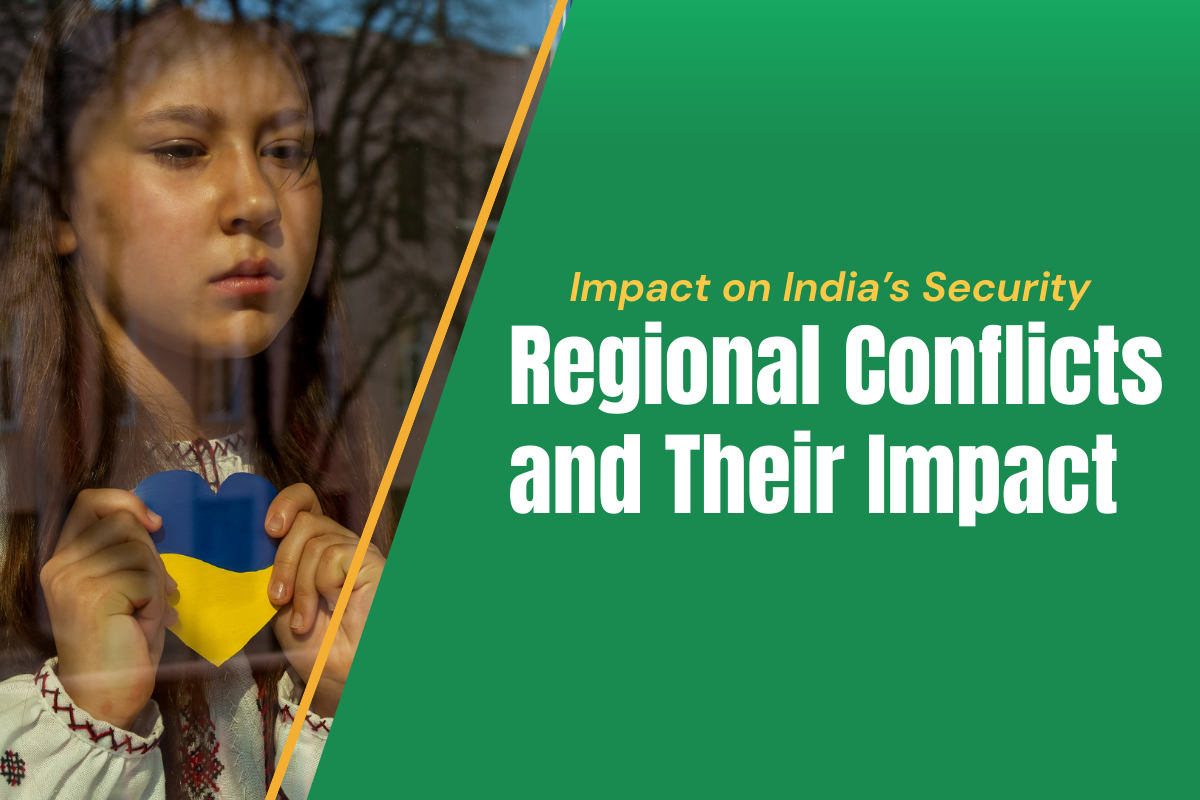
Regional Conflicts and Their Impact on India’s Security
India’s geographical location places it at the heart of South Asia, surrounded by countries with complex political, ethnic, and territorial issues. Regional conflicts in South Asia and neighboring regions directly influence India’s national security, economy, and foreign policy.
For a UPSC aspirant, understanding the impact of regional conflicts is crucial for GS Paper 2 (International Relations), GS Paper 3 (Security), and Essay writing.
Why Regional Conflicts Matter for India
India shares borders with seven countries and maritime boundaries with several others.
Regional instability affects border security, internal peace, economy, and diplomacy.
Many conflicts involve cross-border terrorism, insurgencies, and external powers.
Major Regional Conflicts Affecting India
1. India-Pakistan Conflict
Issues: Kashmir dispute, cross-border terrorism, ceasefire violations.
Impact on Security:
Frequent infiltration across Line of Control (LoC).
Terrorist attacks like Pathankot, Uri, Pulwama.
High defense expenditure due to continuous military deployment.
2. Afghanistan Conflict
Issue: Instability after US withdrawal and Taliban’s rise.
Impact on India:
Security concerns in Jammu & Kashmir due to radical groups.
Loss of India’s investments in Afghan infrastructure projects.
Threat of increased drug trafficking and arms smuggling.
3. India-China Border Disputes
Issue: Long-standing disputes over Aksai Chin and Arunachal Pradesh.
Impact:
Galwan clashes (2020) highlight military tensions.
Heavy military presence in Ladakh and Arunachal sectors.
Concerns over China’s close ties with Pakistan.
4. Myanmar Conflict
Issue: Military coup (2021) and ongoing civil unrest.
Impact on India:
Refugee influx into Mizoram and Manipur.
Disruption of cross-border trade and Act East Policy.
Concerns of insurgent groups using Myanmar’s territory.
5. Sri Lanka Political & Economic Crisis
Issue: Economic collapse (2022) and political instability.
Impact:
Security concerns over foreign influence in Sri Lanka’s ports.
Refugee inflow to Tamil Nadu during crises.
Challenges in safeguarding India’s maritime interests in the Indian Ocean.
6. Middle East Conflicts (West Asia)
Issue: Ongoing instability in Israel-Palestine, Iran tensions, and Gulf conflicts.
Impact on India:
Safety of over 8 million Indian diaspora in the Gulf.
Dependence on Gulf countries for oil imports.
Terror financing networks linked to radical groups.
Broader Impacts on India’s Security
Cross-Border Terrorism: Training camps in neighboring countries target India.
Refugee Influx: Creates pressure on border states (Bangladesh, Myanmar, Sri Lanka).
Maritime Security: Chinese naval presence in Indian Ocean raises concerns.
Economic Impact: Instability affects trade routes and foreign investments.
Diplomatic Challenges: India balances relations between conflicting powers.
India’s Response to Regional Conflicts
Military Preparedness
Strengthening border infrastructure.
Deployment of advanced surveillance technology.
Diplomacy
Promoting peace talks and regional cooperation.
Active participation in SAARC, BIMSTEC, and SCO.
Strategic Partnerships
Ties with US, Japan, Australia (QUAD) for Indo-Pacific security.
Defense cooperation with Israel, Russia, and France.
Internal Measures
Stronger counter-terrorism laws (UAPA, NIA).
Focus on cyber and maritime security.
Notes for Quick Revision
📌 India faces security challenges from Pakistan, China, Afghanistan, Myanmar, Sri Lanka, and West Asia.
📌 Impacts include terrorism, border tensions, refugees, maritime security, and economic risks.
📌 India’s response = military strength + diplomacy + regional cooperation.
📌 UPSC angle: Link with GS Paper 2 & 3, essays on security & foreign policy.
Final Thoughts
Regional conflicts around India will continue to shape its security policies and foreign relations. While military preparedness is essential, India must also rely on diplomatic engagement, regional cooperation, and strong counter-terrorism measures.
For aspirants, understanding these conflicts is not only vital for exams but also for appreciating the strategic role India plays in maintaining peace and stability in South Asia and beyond.
Latest Blogs
Ask your Query
Browse By Category
- Daily Current Affairs (4)
- EPFO (4)
- HP Allied (4)
- HPAS/HAS (9)
- IAS (10)
- Monthly Current Affairs (1)
- PCS (9)
- Uncategorized (1)
- UPSC (9)
- Weekly Current Affairs (2)
- Yearly Current Affairs (5)

Archives
- September 2025 (7)
- August 2025 (10)
- July 2025 (6)





Leave Comment